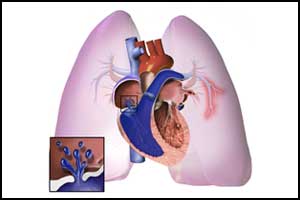- Home
- Editorial
- News
- Practice Guidelines
- Anesthesiology Guidelines
- Cancer Guidelines
- Cardiac Sciences Guidelines
- Critical Care Guidelines
- Dentistry Guidelines
- Dermatology Guidelines
- Diabetes and Endo Guidelines
- Diagnostics Guidelines
- ENT Guidelines
- Featured Practice Guidelines
- Gastroenterology Guidelines
- Geriatrics Guidelines
- Medicine Guidelines
- Nephrology Guidelines
- Neurosciences Guidelines
- Obs and Gynae Guidelines
- Ophthalmology Guidelines
- Orthopaedics Guidelines
- Paediatrics Guidelines
- Psychiatry Guidelines
- Pulmonology Guidelines
- Radiology Guidelines
- Surgery Guidelines
- Urology Guidelines
Prenatal antidepressant use linked to pulmonary hypertension in newborn

Exposure to selective serotonin reuptake inhibitors (SSRIs) and serotonin-norepinephrine reuptake inhibitors (SNRIs) during pregnancy is associated with an increased risk for persistent pulmonary hypertension of the newborn (PPHN), reports the results of a network meta-analysis published in the American Journal of Obstetrics and Gynecology(AJOG).
Reem Masarwa and associates conducted a study to evaluate the association between exposure to SSRIs and SNRIs during pregnancy and the risk for persistent pulmonary hypertension of the newborn (PPHN) and also to compare the risk for PPHN between specific SSRI agents.
The investigators analyzed the retrospective cohort studies and case-control studies reporting the risk for PPHN in the offspring of women exposed to SSRIs or SNRIs during pregnancy.
A network meta-analysis was conducted, incorporating direct and indirect comparisons among different SSRIs. A total of 11 studies were identified. A total of 156,978 women and their offspring were exposed to SSRIs or SNRIs during pregnancy. The primary outcome was the risk for PPHN after exposure to SSRIs or SNRIs during pregnancy.
Read Also:Viagra prevents rebound Pulmonary Hypertension in infants
Key study findings:
- PPHN was detected among 452 exposed offspring, representing an incidence rate of 2.9 cases per 1000 live births and a number needed to harm of 1000.
- The risk for PPHN was significantly increased in the analysis of exposure to SSRI/SNRI in any trimester as well as in analysis restricted to exposure after week 20.
- In network meta-analysis, sertraline was ranked most likely to have the lowest risk for persistent pulmonary hypertension of the newborn (PPHN) among the different SSRIs.
“ According to our findings, sertraline ranked as most likely to have the lowest risk for PPHN compared to other SSRIs, suggesting it may have the best safety profile for use in pregnancy in this regard. Further studies are needed to fully establish these results”, write the authors.
For reference log on to https://doi.org/10.1016/j.ajog.2018.08.030

Disclaimer: This site is primarily intended for healthcare professionals. Any content/information on this website does not replace the advice of medical and/or health professionals and should not be construed as medical/diagnostic advice/endorsement or prescription. Use of this site is subject to our terms of use, privacy policy, advertisement policy. © 2020 Minerva Medical Treatment Pvt Ltd